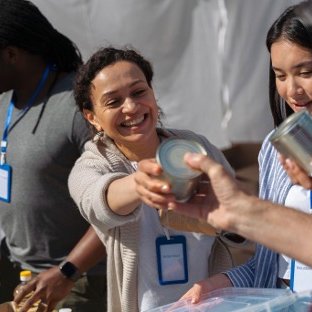Image: Freepik
But those tides are shifting. Across continents and industries, stories are emerging of young professionals transforming not just how they work, but how we think about work itself. What once felt like closed doors are being unlatched—through skill-building, advocacy, innovation, and persistence. Thriving isn’t a distant hope. It’s already happening.
Learning That Builds Toward a Future
Many young adults with disabilities are entering programs that let them learn new trades and gain experience in live environments—from digital design to hospitality, coding to customer service. These setups don’t merely pass on knowledge; they provide agency, practical confidence, and economic relevance. Crucially, they treat participants not as charity recipients, but as emerging professionals with unique strengths. For many, that’s the first time learning has felt like a ladder rather than a wall. And in every country where this approach takes root, the business world gains thinkers who see around corners.
Flexible Online Degrees That Open Doors
For some, traditional classrooms aren’t just limiting—they’re inaccessible. That’s why online business degrees built for flexibility can make all the difference. These programs teach essential skills like financial planning, organizational leadership, marketing, and project management—all through self-paced modules and adaptive course design. Whether you’re aiming to run your own venture or lead within an existing company, this may help bridge the gap between potential and opportunity. It’s not just a degree; it’s a structure for building momentum on your terms.
Advocacy That Changes Workplaces
Thriving at work starts long before the first paycheck. It begins with being seen, heard, and welcomed. That’s why the rise of advocacy-led change matters so deeply. When employers embrace cognitive differences or physical access as part of their growth model—not a compliance checkbox—something powerful happens. The workplace shifts from a site of struggle to a source of strength. And for young professionals still discovering their voice, that shift makes all the difference. It signals: You belong here. Not as an exception. As an asset.
Programs That Do More Than Place People
Not all jobs are created equal—and not all job programs treat disabled candidates with equal seriousness. The best ones? They go far beyond placement. They focus on identity, agency, and long-term fit. Whether it’s a supported employment model in a local café, or a career exploration program in a multinational company, the emphasis isn’t just on getting hired. It’s on building sustainable paths. These programs pair skill development with emotional scaffolding, helping young adults explore who they are as workers, teammates, and future leaders. That clarity doesn't just serve the candidate—it shapes a stronger, more aware workforce.
Employers Built for Neurodivergent Brilliance
Some of the most innovative employers today are small, nimble, and purpose-built for inclusion. They don’t just accommodate—they hire with intention. Especially in industries like IT, media, and analysis, companies are discovering that hiring neurodivergent professionals isn’t a compromise. It’s a competitive edge. These teams structure their workspaces to reduce sensory overwhelm, break down vague communication, and create feedback loops that make performance expectations explicit. And when they do, they unlock brilliance that traditional systems miss. For young adults who’ve been told to “tone it down” or “stay in the background,” these workplaces feel like home.
Self-Employment as a Serious Path
For many young professionals with disabilities, entrepreneurship isn’t a side hustle—it’s the main road. Freelancing, starting a business, or running a service operation allows them to structure environments around their access needs, communication styles, and creative rhythms. It’s not about escaping the system. It’s about rewriting the rules. More and more policy briefs and global think tanks now acknowledge that self‑employment can foster inclusion at scale—especially when paired with accessible funding and mentorship ecosystems. These entrepreneurs aren’t just building income. They’re building models others can follow.
Mentorship and Internships That Open Doors
When early career experience is paired with trust and support, everything changes. Internships and mentorships remain two of the most powerful tools for launching professional momentum—especially when they’re designed for equity. Across regions and industries, programs now exist to match disabled young adults with real-world learning placements, global internships, or peer mentorships that evolve into networks. These opportunities offer more than résumés. They offer fluency: in the rhythms of a team, in the subtle norms of a workplace, in the confidence to contribute. And that fluency often turns into forward motion.
The journey into the business world doesn’t start or end with a diagnosis, a job title, or an access form. It unfolds through relationships, real-world experience, and environments that make space for complexity. Young adults with disabilities are not waiting for the future to include them—they’re already shaping it. And the more we build ecosystems that recognize potential over pathology, difference over deficit, the stronger that future becomes. Not just for them. For all of us.
Discover a path to better mental health and wellbeing with Wye Dean Wellbeing, where expert support and community resources are just a click away.




